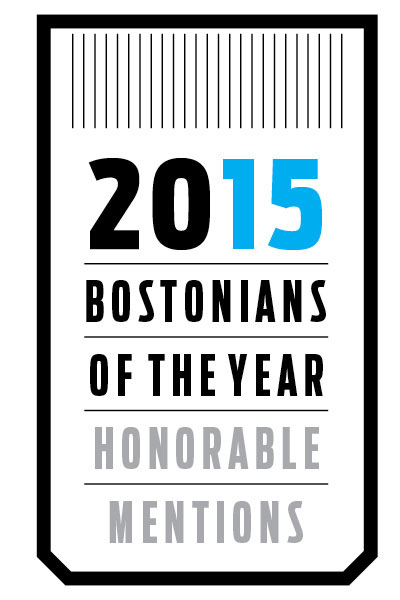
For more honorable mentions and the winning Bostonians of the Year, click on the drop-down list at the bottom of this article.
In early May, during a meeting on genome engineering at the Broad Institute, a visiting researcher named Eugene Koonin mentioned that some obscure bacteria might have an unrecognized talent: to cut DNA in a way that biologists had never seen before. Even to many scientists, that might seem like the most trivial of trivial observations. But Feng Zhang isn’t like most scientists. At 34, the MIT professor is one of the world’s most creative and influential biological engineers, able to see possibilities where others don’t.
Mention of the bacteria’s DNA-cutting molecule made Zhang’s ears prick up. After all, using molecular scalpels to precisely cut DNA is the basis of the discovery that made him internationally famous: how to edit the cells of plants and animals, including humans, in ways that promise to find treatments for devastating diseases, including autism, schizophrenia, cancer, and depression. The genome-editing system, called CRISPR-Cas9, works like a genetic word processor, finding a target gene and replacing it with a new one. CRISPR has already been used to make human cells in lab dishes impervious to HIV, to identify genes that allow cancer to spread, to cure mice of muscular dystrophy, to create micro-pigs that a Chinese genetics institute is selling as pets, and to make mosquitoes that block the malaria parasite. CRISPR is so powerful that it has also ignited a global furor over fears that it could give humans tools to wreak havoc with evolution and make possible “designer babies,” with wealthy parents “CRISPR-ing” their children to be smarter and better looking.
Zhang is fully aware of such risks. But he is also a passionate believer in CRISPR’s potential for good. After hearing about the new DNA-cutting molecule from Koonin in May, Zhang walked over to one of his graduate students and asked, “Are you busy?” Bernd Zetsche knew that meant “How would you like to drop what you’re doing and switch to something that could be really big?” Zetsche’s answer was never in doubt.
In late September, Zhang, Koonin, and their collaborators reported in the journal Cell that they had found a new family of molecular scalpels that can edit human and other genomes. Three months is an astonishingly fast turnaround for a discovery like that. “Somehow,” Zetsche told me earlier this year, when I was writing about Zhang for STAT, “everything goes faster in this lab.”
Zhang’s greatest achievement to date arguably came in 2013, when he and colleagues published a paper in Science reporting that they had used CRISPR-Cas9 to edit mouse and human genomes. Although scientists had other editing tools, CRISPR-Cas9 was to those techniques as a Lamborghini is to a Model T — lightning fast, powerful, and elegant. CRISPR “really opened the floodgates to a new era in molecular biology,” says Zhang, who is the youngest head of a lab at the Broad Institute and who also has an appointment at MIT’s McGovern Institute for Brain Research. In 2014, MIT and the Broad Institute received a key CRISPR patent (which is being challenged by the University of California), with Zhang listed as inventor. The breakthrough helped make CRISPR the hottest of hot topics in biology. The number of papers with CRISPR in its title rose from 69 in 2012 to more than 1,280 to date, according to NIH’s PubMed database.
Ever since that 2013 breakthrough, Zhang has used CRISPR to make discoveries or improve its genome-editing abilities. In 2015 alone, he used it to edit mice genomes in a way that lowers cholesterol levels and to identify genes that promote tumor growth and the spread of cancer.
Zhang’s productivity, his colleagues say, reflects his talent for identifying a biological “killer app” and redeploying his graduate students and postdocs to get the project done fast. “He runs the lab like a tech startup,” says graduate student Winston Yan. “When he or someone has an idea, he puts more resources into it. But he always asks, ‘Is it a hack or an innovation?’ He’s interested only in things that will be really important.”
Of his team, Zhang says, “I try to pick people who are passionate, who are curious about how things work and want to do something to make the world a better place.”
Of all humankind’s ills, Zhang is most driven to find treatments for neurological diseases like Alzheimer’s and psychiatric disorders like depression, which devastated one of his closest friends when he was an undergrad at Harvard. Conditions that rob people “of what makes them human — their ability to think, to remember, and to find joy in the world,” as he puts it — make him work tirelessly to see if genome editing can lead to cures. So after dinners with his wife and young daughter at their apartment in Cambridge, Zhang often returns to his lab, working at the bench with his students until after midnight.
There’s always another amazing idea to pursue.
Read more from the Bostonians of the Year issue:
Select a name from the drop-down list below.
Sharon Begley is senior science writer at STAT. Send comments to magazine@globe.com.Open all references in tabs: [1 – 4]
